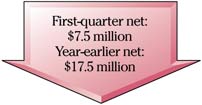Investments,
costs drag on
HMSA’s results
Hawaii Medical Service Association, whose reserve level was hotly debated in this year's Legislature, posted a 56.9 percent decline in first-quarter net income as rising health-care costs and a dismal stock and bond market dragged down earnings.
![]()

HMSA, which recently received approval to increase small-business rates 4.9 percent beginning July 1, saw its reserve fall 0.4 percent to $538.7 million at the end of the quarter, or 32.2 percent of annualized expenses, from $541 million at the end of December, or 34.3 percent of annualized expenses.
A Senate bill that would have lowered a health insurer's maximum reserve level to 30 percent of annual expenses from 50 percent died in the Legislature this year after failing to be heard by a conference committee. An amended version of the bill also had sought to freeze the 4.9 percent rate increase for small businesses that HMSA requested.
"Health care costs are going up faster than rate increases are," HMSA Chief Financial Officer Steve Van Ribbink said. "In particular, what we're beginning to see is a ramping up of that trend of health care costs. We've noticed that hospital costs increased significantly in 2004 and continue to do so in 2005."
Revenue, or the dues collected from the nonprofit insurer's 691,543 members, rose 5.2 percent to $419.1 million from $398.2 million a year earlier, as HMSA membership increased 1.7 percent. But that was more than offset by a 7.6 percent increase in health care costs to $379.4 million from $352.6 million, and a 10.1 percent boost in administrative costs to $35.2 million.
As a result, HMSA's operating gain nose-dived 66.8 percent to $4.5 million, or 1.1 percent of revenue, from $13.6 million, or 3.4 percent of revenue.
Van Ribbink said administrative expenses will run higher this year because the insurer is absorbing the costs of a new $40 million computer replacement project that it will be implementing over the next three years. The information technology costs will run between $15 million and $16 million this year.
He also said he expects health care costs to rise about 8.1 percent this year, higher than in the past couple of years.
Van Ribbink said HMSA's reserve at the end of this year ironically could end up at the 30 percent level the insurer has resisted.
"We don't think 30 percent was the proper ceiling to begin with," he said.
"But it may well turn out by just how the trends are this year and what happens in the marketplace that we could end up at the end of the year with 30 percent anyway. We aren't trying to do that but it's the way things could evolve."
He said critics of HMSA's reserve surplus shouldn't take any satisfaction that the level dropped because of the insurer's lower earnings.
"If they're smart, they'd say that's a real bad thing because what that means is that (HMSA is) probably going to want to raise rates down the road," Van Ribbink said.
"If we are doing really well, people should be happy because to the extent that we do well, we don't have to raise rates as much. That's how the astute person on the street should view it."
E-mail to Business Desk
[News] [Business] [Features] [Sports] [Editorial] [Do It Electric!]
[Classified Ads] [Search] [Subscribe] [Info] [Letter to Editor]
[Feedback]
